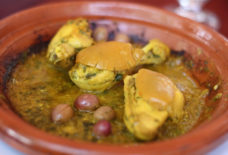Photo: Jay Hajj
By Michael Floreak
Chef and restaurateur Jay Hajj has been turning out memorable American comfort food at Mike’s City Diner in the South End for nearly two decades, and has made fans of everyone from Bill Clinton to Guy Fieri along the way. But long before Hajj operated a successful diner or bought the former Locke-Ober building to open Yvonne’s, he and his family escaped war torn Lebanon to settle in Roslindale in 1978. Hajj tells of the journey in “Beirut to Boston: Comfort Food Inspired by a Rags-to-Restaurant Story.” The book, to be released in May, combines stories from Hajj’s life with dozens of recipes including the Southern-style breakfast he served to Clinton and a version of the chicken pate his mother kept as emergency food in Lebanon.
Q. How did you choose the recipes for the book?
A. I wanted to do something of what I love from my life — the Middle Eastern food that’s very important to me, the comfort American food that’s so important. All these foods that are important to me and really kind of changed my life from the beginning; for example, the chicken pate. Just to take that memory of my mother always having a can ready to go just in case we needed to flee. Throw some bread in a bag or some labneh [strained yogurt] and be ready to go.
Q. How did your family leave Lebanon?
A. We just abruptly left. We didn’t know we weren’t going to go back. We stayed at a refugee camp. Beirut got so bad that we couldn’t get home. We were gone for three months at some Chinese school. They housed refugees like three families to a classroom. The civil war was always there. I think it was always in my parents’ minds to move. I had a whole family that got slaughtered in Lebanon.
Q. How did you end up in Boston?
A. My father came first, got a job, got things together, rented a house. He had sisters here who brought him here. Then maybe a year, a little over, we followed. We didn’t know if we were going to stay for a long time. We thought maybe we were just going to stay until the craziness, the civil war, stopped. By the time that happened we were all situated and became American at that point.
Q. What did you think when you arrived in Boston?
A. As kids, we were excited. We watched [everything] from Steve Austin to Wonder Woman to the Incredible Hulk. But when we came it was extremely tough. I was very young. I didn’t get the language right away. I couldn’t wait to get back, the first two or three years. Then after a while you just grow into it. You make new friends and you’re part of the whole neighborhood. I couldn’t think, looking back, of a better place than where I grew up in Roslindale.
Q. Your family wasn’t in the restaurant business. How did you discover it?
A. I started very early working, not because I wanted to work in a restaurant. The reason was, I was getting all the hand-me-down clothes, and it wasn’t even good hand-me-down clothes. It was no name brand. I remember the first thing I bought was my New Balance sneakers. First I washed dishes. Then one day a week or two days a week, I started as a salad boy, then I started cooking. I started young and I cooked a lot in different places, from Italian food to Greek food to even Lebanese food.
Q. You were also very young when you bought your first restaurant in Brookline.
A. I was right out of high school. I was getting in a lot of trouble back then. I realized I’m at that age now where it’s not cool anymore. I need to do something. I didn’t have much money. Temptations was an ice cream place that wasn’t doing well. So I figured I could go in and add sandwiches to it, maybe like hummus. It was one of those situations where I was making just enough money to live and I couldn’t just walk away because I had everything in it. I waited it out for about five years and I sold it. With that money, I found Mike’s. Back then Mike’s, and that area, wasn’t doing very well. In a year, actually, it was doing good enough. My wife and I got married. Since then, it’s been nothing but great.
Q. How was it to go back to Lebanon as an adult?
‘First I washed dishes. Then one day a week or two days a week, I started as a salad boy, then I started cooking. I started young and I cooked a lot in different places.’
A. When I first came here, I always wanted to go back — from day one. For me, it was extremely healing to see where I used to play and hang out and our old apartment. It was cool, but that’s when I realized again that I’m so glad that I’m in the US and I’m an American. I realized this is great to see Lebanon and to see family. But I want to go back home.









